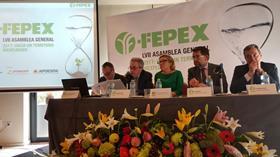
The value of Spanish exports of fresh fruit and vegetables increased by 5 per cent in 2016 reaching €12.486bn, according to government figures. Export volumes fell by 2 per cent to 12.5m tonnes.
Vegetable exports totalled €5.206bn, 7.5 per cent more than in 2015, with volumes totalling 5.2m tonnes, an increase of 2.4 per cent on the year earlier. Among the biggest increases were pepper exports (+12 per cent to €930.8m), cucumbers (+15 per cent to €547m), cabbage (+7 per cent to €457m) and lettuce (+4 per cent to €656.6m). Tomato shipments remained stable at €959.5m.
Although fruit exports were down 5 per cent in volume, they registered a 3 per cent increase in value to €7.279bn. Berries were among the best performing sectors, with shipments of blueberries, raspberries and strawberries rising by 23 per cent, 30 per cent and 6 per cent respectively to €257.7m, €306.5m and €583m.
It was a mixed year for stonefruit, with peach exports increasing by 7 per cent to €387m, nectarines down 7.7 per cent to €413m and apricots stable at €115.3m.
Melon and watermelon exports grew 13 per cent and 11.5 per cent respectively to €303m and €333m.
By destination, the EU accounted for 92.6 per cent of Spanish exports or €11.565bn, a 5 per cent increase on 2015. Shipments to extra-communitary European markets fell by 5 per cent to €331.7m, principally due to the ongoing Russian veto and a slowdown in shipments to Norway.
Exports to non-European countries increased by 11 per cent to €589m, with shipments to Brazil growing strongly (+23 per cent) to reach €109m.
Imports, meanwhile, maintained the upward trend seen in recent years, rising in 17 per cent in value and 12 per cent in volume to €2.313bn and 2.9m tonnes respectively.
Exporter federation Fepex said although the record export value reflected the positive evolution of the sector, there was concern that export growth has failed to keep pace with import growth.
“We believe this trend, which is being observed throughout the European Union, is due to the implementation of national protectionist policies both within the Single Market and in third countries, among other causes,” Fepex said.



